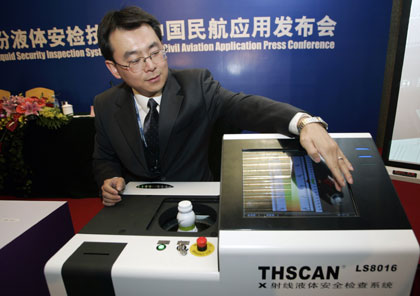Airports to scan for liquid explosives
(Reuters)Updated: 2006-12-12 16:09
China will introduce special machines at its 147 civil airports to spot liquid explosives, a senior Chinese official said on Tuesday, vowing to protect travellers during the 2008 Olympics from terror attacks.
The newly developed machines, described by its Chinese maker NUCTECH as the world's most sophisticated, will be installed gradually nationwide, said Yang Chengfeng, head of the General Administration of Civil Aviation of China's security division.
China banned passengers from taking almost all liquids on flights in hand baggage following a crash in May 2002 off the northern city of Dalian, which killed 112 people and was blamed on a passenger setting fire to gasoline carried in soft drink cans.
"If you want to guarantee passenger safety, you have to make an investment. We have to protect against liquid explosives," Yang said on the sidelines of a news conference to unveil the new machines, already on trial at a few Chinese airports.
"I'm preparing to install these machines at all of China's civil airports," he said, without providing a timeframe.
Yang declined to give an investment figure, but the scanners are sold at $200,000 a unit on the international market, NUCTECH executives said.
The European Union and United States earlier this year introduced strict controls on what liquids could be carried onboard after British police said they had foiled a plot in the summer to blow up aircraft using liquid explosives.
Yang added that China had not discovered any specific terror threats to its airlines or airports, but this did not mean the threat was not real.
"Every country has people who are dissatisfied with society, though we've never had anything like September 11," he said.
China did see a rash of hijackings in the early 1990s, mostly by people demanding to go to Taiwan island and air safety was tightened.
China adopted additional security measures after the September 11, 2001, attacks on the United States, including putting air marshals on flights.
Yang promised safe travel for passengers during the 2008 Beijing Olympic Games, saying the civil aviation authority was looking at enacting new security measures, such as having separate security channels for passengers.
Even with the new scanners, he said the ban on most types of liquids being taken on board in hand luggage would remain.
"We have confidence that the Olympics will be safe," Yang said.
"We had 48 heads of state come through Beijing airport during the China-Africa Summit," he added. "I think this was a rehearsal for the Olympics."
Yang said he was certain that China's airport security was as good as any in the world, including in those countries reguarly threaten by terror attacks.
"Israel has very strict security and so do we. Many other countries are not as good as we are."
|
||
|
||
|
|

